
Reactions were mixed to a California group’s proposed takeover of CareOregon during virtual listening sessions the state hosted Wednesday.
Under the proposal, SCAN Group, a California-based nonprofit that oversees Medicare Advantage plans and other programs, would essentially acquire control of CareOregon, a nonprofit that provides health care to more than 500,000 low-income Oregonians.
If the deal is approved, a new entity, HealthRight Group, would be formed, with the same leadership and out-of-state headquarters that operates SCAN. CareOregon and SCAN would become subsidiaries of HealthRight.
“CareOregon will pay SCAN Group $120 million to become a subsidiary of HealthRight, and CareOregon will contribute $25 million to launch a charitable foundation to serve the needs of Oregonians,” Stacy DeLong of the Health Care Market Oversight Program said during one of the sessions.
Leaders of the nonprofits say the merger will strengthen their efforts to serve the public as they try to compete in Medicare and Medicaid markets.
But CareOregon’s role as a major player serving members of the Oregon Health Plan — including a central role in Health Share of Oregon, the organization overseeing OHP care in greater Portland — means practitioners and health care insiders are closely watching the deal.

Tom Sincic, a retired Multnomah County family nurse practitioner and health care reform activist, spoke during the listening session Wednesday morning. “CareOregon was founded to enhance access to care to local communities,” he said in accompanying written comments. “Oregon should not allow over $1 billion dollars and a well performing clinical network to move to out of state management/control … Whether for profit or nonprofit, a move to a multistate company reduces the accountability that an organization has to any one state or even more so to the local community it is supposed to serve.”
Dr. Andrew Mendenhall, CEO of the Portland nonprofit Central City Concern, however, spoke in favor of the merger during the sessions. (Disclosure: Mendenhall is a member of The Lund Report’s newly formed community advisory board.)
“This initiative reflects the urgency to establish a locally controlled, community-based, non-profit payer model that can not only survive but thrive in today’s increasingly consolidated and for-profit healthcare landscape,” he said in his written version of the comments. “Both organizations share a deep dedication to providing quality care for individuals often marginalized by our healthcare system.”
Other providers and organizations also weighed in with written comments, most of them supportive. They included Chair of the Tillamook Board of Commissioners Erin Skaar, who sits on the board of one of the care organizations operated by CareOregon, Columbia-Pacific Coordinated Care Organization. “I believe that establishing HealthRight Group is a powerful step to ensure that health care in Northwest Oregon remains locally controlled, community-based and puts people before profits,” Skaar wrote.
Those with concerns about the merger, however, dominated the afternoon session.
An unnamed nurse practitioner from Southern Oregon said, “My concern with this larger organization is how can we be totally confident that we won’t have additional complexities with the larger organization and, you know, being able to control locally our specific needs within our community, working with the local HMOs and other clinics and services in our area.”
Michael, a therapist in Southern Oregon, echoed the nurse. “One of my major concerns about this merger is how that’s going to affect the individual CCOs that are part of Care Oregon,” he said.
Charles Gallia, a former Oregon Health Authority employee, said that Oregon Health Plan care organizations are supposed to reinvest in their local communities’ well being. That community orientation is “not something that can be handled by outsourcing,” he said. “I think that this move is actually dismantling something that has taken decades to do.”
Attendance at the listening sessions was sparse, perhaps because their timing, or because publicity of the notice was buried in the website of an obscure program — Oregon’s relatively new health care merger-review office — as well as in a press release that drew limited media coverage. Members of the public looking at the website have to wade through numerous technical filings. One speaker in the afternoon session who did not give their name expressed frustration after state employees declined to answer any of the public’s questions, saying the session was intended only to accept comment.
“I’m having a bit of difficulty with this format because this feels very pro forma to me, so you’re hearing our fears, but there’s no interaction that’s giving us information … It just feels awkward to be voicing our fears without any way to get reassurance or information.”
John Santa, member of the board overseeing the Oregon Health Authority who’d commented earlier, testified on his own behalf and agreed that the issue is complex He said while lawyers might be able to figure it out, “for the rest of us, it’s a challenge.” He urged people to take the time to learn about the merger, stressing its importance and saying “the ship has not yet left the harbor.”
More public hearings are in the works. A separate program within the Oregon Health Authority will hold hearings and conduct its own review of the merger, while focusing on its impact on the Oregon Health Plan.
The state Department of Consumer and Business Services, which oversees health insurers, will also conduct further review, based in part on the Oregon Health Authority’s recommendation.
The merger of nonprofits will also undergo the review of the Oregon Department of Justice.
The state’s merger program, the Health Care Market Oversight unit, expects to complete its work by mid-January, according to a spokesperson, Erica Heartquist.